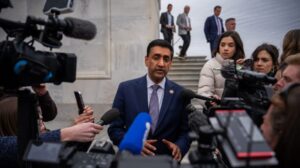Congress
Meet the new members: A Kamala Harris protegee rises
The new member: Rep. Lateefah Simon (D-Calif.)
How they got here: Simon bested a fellow Democrat, Jennifer Tran, in the general election for this solidly Democratic seat based in Oakland. She won 65 percent to 35 percent.
Inside the campaign: Simon was a heavy favorite in this contest after jumping into the race to replace long-time Bay Area Rep. Barbara Lee (D-Calif.) in February 2023. (Lee ran unsuccessfully for Senate.)
She got a major boost when Democratic Gov. Gavin Newsom backed her candidacy to succeed Lee in a statement to Blue Light News in November 2023. Simon emerged well ahead of the rest of the pack in the March 2024 primary with 55 percent of the vote.
The issues she’ll focus on: Simon has said she wants to be an advocate for people without political power — a mission she’s focused on throughout more than two decades in public service. That includes expanding access to disability services, building more affordable housing and expanding access to health care.
Expect a continuation of Lee’s outspoken progressive record throughout Simon’s time in Congress. “I’m a deep blue Democrat and I still am a deep mentee to Vice President Harris,” Simon said upon reaching the Capitol for new member orientation. “We’re going to fight for the lifeblood of our people. I’m here not just to serve, but to lead.”
Background: Simon’s benefitted from the mentorship of both Lee — she passed Simon a literal baton to her congressional seat — and Vice President Kamala Harris. She worked under Harris for about four years when the future vice president was San Francisco district attorney.
More recently, Simon served on the Bay Area Rapid Transit board of directors and was also a member of the board of trustees of the California State University system. She’s also been an outspoken advocate for racial and civil rights across a variety of organizations in the Bay Area.
Campaign ad that caught our eye: Simon ran an ad promising to “lock arms” with Harris on initiatives like banning assault weapons and ensuring public safety.
Of note: She’ll become one of the few openly blind members of Congress to ever serve.
We’re spotlighting new members during the transition. Want more? Meet Rep. Maggie Goodlander.
Congress
This Indiana Democrat wants a redistricting ceasefire
As Republicans in his state’s legislature considered joining a Donald Trump-backed effort to redraw congressional maps in the GOP’s favor, Rep. Frank Mrvan kept quiet.
The new lines would have doomed the low-key Democrat representing Indiana’s northwest corner, but only now — after Republicans in the state Senate roundly rejected the Trump push — is he speaking out with a message for both parties: It’s time to lay down arms on redistricting.
“I do not believe all-blue and all-red states benefit anyone,” Mrvan said in an interview. “We need to have unifying factors that bring our country together again, like lowering health care costs and being able to make sure that when someone goes to a grocery store, they can afford beef and provide for their families and have safe communities. I don’t know if it’s a priority to manipulate maps for one party or the other to be in the majority.”
While Indiana’s attempt at mid-decade redistricting is now in the rearview mirror, other states have not ruled it out. The GOP-controlled Florida legislature is now exploring new maps, but so are the Democratic majorities in Maryland and Virginia. Both parties are also closely watching a forthcoming Supreme Court decision on the Voting Rights Act that could prompt new maps in southern states.
After Trump kicked off the mid-cycle redistricting push by prodding Texas Republicans to draw new lines that could oust as many as five Democrats in 2026, many House lawmakers aired private concerns about the disruptive and divisive process that was not guaranteed to net GOP seats in the midterms. Many fewer spoke out publicly, given fear of retribution from Trump.
Now a growing number of Democrats are eager to exact revenge. California Gov. Gavin Newsom pushed through a ballot measure that will allow Democrats to offset the Texas losses, but some are eager for more — with Mrvan among the few who have been willing to say that would be a bad idea.
Rep. André Carson, the other Indiana Democrat whose district was at grave risk in a redistricting scenario, defended the blue states that are still looking to act, saying it was “all a reaction to what happened in Texas.”
“My hope is that this will inspire other legislative bodies to push back against Donald Trump’s very extremist agenda that is helping himself but hurting Americans,” Carson said. Pressed on blue-state redistricting, he said those legislatures “are going to have to make that decision on their own.”
Carson and Mrvan among a dwindling number of midwestern Democrats in an increasingly coastal caucus who just survived a political near-death experience. The fact is, they might have only gotten a temporary reprieve: Post-census redistricting just six years away could put them in peril once again.
Mrvan has already been targeted by national Republicans, winning a costly 2022 race by about 6 points. But he described working quietly behind the scenes to convince statehouse leaders that drawing him out of his seat would be a bad idea.
The 31-19 final vote killing the proposal didn’t have anything to do with pressure from him, Mrvan emphasized, but he had been in touch with GOP state senators who had been victims of harassment including “swatting” incidents to check on their safety.
“I think it was very clear they were going to vote their conscience and what they believed in, and there is no inside track that they were sharing with me the process and what was going on,” he said — while also personally thanking four GOP state senators in his district who opposed the redraw “for their act of courage and for unifying our state.”
One message Mrvan did send, he said, was that “redistricting would not benefit the state of Indiana.” As the only Hoosier on the powerful House Appropriations Committee, he argued, his ouster would “take away that leverage” in Congress on major state projects requiring bipartisan cooperation.
He cited recent indications from the owners of the NFL’s Chicago Bears that they could relocate the team from its longtime lakefront stadium just over the state line to Mrvan’s district. “We’re already gathering in a bipartisan way to say we welcome the Bears,” he said.
Carson said he, too, took a soft-touch approach — remaining in communication with GOP members of the congressional delegation and state legislators but allowing them “the freedom and the sovereignty that they have to make decisions, because it is their body.”
“But all hands were on deck,” Carson added.
Both Democrats also said they were in touch with House Minority Leader Hakeem Jeffries starting over the summer as the redistricting push began. Carson recalled that Jeffries pledged support and resources and was “sensitive” to the dynamics of the fight as a former state legislator.
In the end, Carson said, a respectful approach and Indiana’s distinctly midwestern political culture won out over national browbeating.
“I’ve said all along, Hoosiers do things very differently,” he said. “The majority of Hoosiers did not agree with this new unfair map, and Hoosiers made sure the statehouse knew it.”
Congress
Jack Smith’s lawyers ask Jordan for open hearing after closed-door testimony
After appearing in a closed-door deposition with the House Judiciary Committee earlier this week, Jack Smith, the former special counsel who led the criminal cases against President Donald Trump, still wants the chance to defend his work in a public hearing – and defend himself against continued Republican attacks.
Attorneys for Smith are pressing for their client to be allowed to testify in an open forum in a new letter to House Judiciary Chair Jim Jordan, obtained first by Blue Light News.
“[We] reiterate our request for an open and public hearing,” Smith’s lawyers, Lanny Breuer and Peter Koski, wrote to Jordan. “During the investigation of President Trump, Mr. Smith steadfastly followed Justice Department policies, observed all legal requirements, and took actions based on the facts and the law. He stands by his decisions.”
Breuer and Koski also requested that the videotape of Smith’s testimony be released in full so that he can speak to the public directly “rather than through second-hand accounts.”
Smith’s deposition spanned more than eight hours Wednesday, as he spoke to House Judiciary members under oath and stood by his decisions to levy criminal charges against the then-former president for allegedly mishandling classified documents and attempting to subvert the results of the 2020 election.
According to portions of his statement shared with Blue Light News, Smith argued the evidence in his office’s possession would have provided proof of the President’s criminal behavior “beyond a reasonable doubt.”
He never got to fully present that evidence, as Smith was forced to drop both his cases as a result of Justice Department policy that prevents prosecuting the current occupant of the White House. But Trump and his allies have continued to paint Smith as a villainous leader in the campaign to politicize the Biden-era Justice Department.
House and Senate Republicans have vowed to investigate Smith and his office’s work in a crusade that has only become more intense in the wake of revelations that Smith requested phone data for Republican members of Congress as part of his election subversion probe.
Jordan, who has separately already referred Smith’s senior assistant special counsel for criminal prosecution for failing to cooperate with his investigation, said he has not ruled out allowing the Biden era special counsel to testify in an open forum.
There are relatively few details about Smith’s remarks and the exchanges with lawmakers, beyond the portions of his statements shared with reporters. Members of the Judiciary Committee leaving the deposition Wednesday provided relatively few details.
Amid an ongoing Justice Department campaign to levy criminal charges against the president’s perceived enemies, Smith is also navigating a complicated legal minefield: His testimony is hamstrung by grand jury secrecy rules, DOJ policy and an order from a federal judge that a volume of his report surrounding the classified documents case remain under seal.
It’s not clear to what extent Smith told Congressional investigators he could not provide certain information due to the various restrictions on his testimony.
Democrats have argued the decision to hold the private deposition deprived the American public of important information about the president and amounted to an effort to distort the record of Smith’s testimony.
Rep. Jamie Raskin of Maryland, the top Democrat on the House Judiciary Committee, was still hopeful Smith could be given the chance to speak publicly.
“I think somebody should prepare Donald Trump for it, because he will be devastated and humiliated by what he hears,” Raskin said in a brief interview Thursday.
Congress
House Democrats assert themselves as Republicans struggle to set agenda
On paper, Democrats are locked out of legislative power in the majority-rules House. In practice over the past several months, they have been a swaggering force.
Time and again this year, Democrats under Minority Leader Hakeem Jeffries have maneuvered to successfully undercut the GOP agenda and put its leaders on the back foot. From a daily drumbeat on health care to the long-running saga over the late sex offender Jeffrey Epstein to a new focus on the rising cost of living, they believe they’re succeeding by making the party in power talk about Democratic priorities, not its own.
Their success was underscored this week when four House Republicans joined a Jeffries-led effort to force a vote on expiring Obamacare insurance subsidies — a major embarrassment for the GOP speaker.
“Our message to Mike Johnson is clear — you can run, but you cannot hide,” Jeffries said as he took a victory lap on the House steps Thursday.
The New Yorker was referring to his party’s effort to address a so-called health care “crisis” brought about by Republican governance. But it could just as well apply to the overall Democratic attitude at the moment, with the party increasingly buoyant about its political fortunes heading into next year’s midterm elections.
Johnson and his leadership allies have been able to put some wins on the board since lawmakers returned from their summer recess. Republicans ultimately triumphed and ended a record-long shutdown without agreeing to a costly extension of the Obamacare subsidies. They managed to unite and pass a small-bore health care package this week as well as a bipartisan permitting reform bill.
But it has come at a cost. To win the shutdown fight, Johnson kept the House out of session — giving up roughly a fifth of the year’s scheduled legislative days. And managing a razor-thin majority with its constantly clashing factions has left many of his members airing dissatisfaction with the status quo.
“I think the House as a whole has not been nearly as proactive as we should have been in recent months,” said Rep. Kevin Kiley (R-Calif.). “It certainly didn’t help that we weren’t even here for two of those months.”
“I believe that we’re behind,” added Rep. Nancy Mace (R-S.C.). “We’ve got a lot of work to do between now and the midterms.”
With a sizable band of Republican malcontents willing to buck their party’s leadership, Democrats have sought opportunities to divide the majority party — often by using discharge petitions, one of the few legislative tools available to the minority party.
Already this year three discharge petitions have garnered the necessary 218 signatures, forcing votes Johnson tried to avoid on releasing the Epstein files, restoring federal workers’ collective bargaining rights and now extending the Obamacare subsidies for three years. Each one succeeded with the vast majority of Democrats signing on at Jeffries’ direction, with a handful of GOP rebels joining in.
“We’re in the minority, but our ideas are still really good, and they deserve bipartisan support,” said Rep. Greg Stanton (D-Ariz.).
Democrats, Jeffries said, have already “won more discharge petitions in the last three weeks than have been successful in the last 30 years.” More could be coming next year, with more lawmakers planning to move on Russia sanctions legislation and a ban on congressional stock trading.
Beyond the discharge petitions, House and Senate Democrats made a larger strategic calculation in September that has since dominated the congressional agenda: centering a government shutdown fight on health care — in particular, the pending Dec. 31 expiration of enhanced Affordable Care Act tax credits enacted and extended under former president Joe Biden.
The decision shifted the conversation on Capitol Hill away from President Donald Trump’s controversial but popular assault on federal spending to much more favorable political ground for Democrats. The party knew well that health care was a minefield for Republicans — one that many in both parties blamed for the GOP’s massive House losses in the 2018 midterms.
Ultimately, the shutdown ended after 43 days when a handful of Democratic senators decided the standoff had run its course. But House Democrats strategized to keep health care center stage, with Jeffries filing a discharge petition seeking a vote on a straight three-year extension of the expiring tax credits before moderate Republicans started filing their own discharge petitions.
Within a week, it had more than 200 signatures, and as the vulnerable Republicans scrambled for an off-ramp, Jeffries frequently noted the simplest solution would be for a handful of GOP members to sign on to the Democratic effort. Some moderate Democrats mulled backing a competing discharge petition from Rep. Josh Gottheimer (D-N.J.) that would force a vote on his bipartisan plan for a shorter extension with strings attached. But the vast majority of Democrats kept away, signaling they wanted to stay behind Jeffries’ approach.
“Nobody wanted Gottheimer to dictate strategy for the whole caucus,” said one person directly involved who was granted anonymity to speak candidly about strategy.
The maneuvering paid off. While Jeffries kept Republicans and some of his own members guessing by suggesting he might get behind one of the bipartisan plans, he ultimately never wavered on the straight three-year approach.
When, as many Democrats expected, Johnson refused to put one of the compromise extensions on the floor, GOP moderates were left with no choice but to join the Jeffries effort.
Rep. Troy Carter (D-La.) called it an “incredibly strategic move” by Jeffries “to have a discharge petition in place and create a safe space for members to do the right thing.”
The completion of the discharge petition has amounted to an internal debacle for Johnson, whose members are now unhappy that GOP leaders got outplayed and will now vote on a measure that the vast majority of them loathe.
“I hate that we are voting on a three-year clean extension and not a bipartisan bill that has smart reforms to the tax credits,” Rep. Don Bacon (R-Neb.) said. “The worst option is being put on the floor — and one that the Senate will not pass.”
Republican leaders, for their part, initially underestimated whether enough of the moderate holdouts would be willing to break ranks and sign on to Jeffries’ discharge petition. They viewed two in particular — Pennsylvania Reps. Rob Bresnahan and Ryan Mackenzie — as unlikely to sign given their willingness to fall in line on the GOP megabill over the summer, according to two people granted anonymity to describe internal conversations.
But as each side dug in early this week and leaders moved away from allowing a floor vote on a compromise amendment, the moderates made clear to GOP leaders they would retaliate via the Jeffries discharge petition. Bresnahan and Mackenzie were among the four who signed, pushing it over the top.
Majority Leader Steve Scalise said in an interview that the possibility of the moderates linking arms with Democrats “was heavily discussed” and that leaders “didn’t want it to happen.”
“But, you know, we tried to find a different way to address it,” he said. “I mean, nobody was blindsided.”
-

 Politics10 months ago
Politics10 months agoBlue Light News’s Editorial Director Ryan Hutchins speaks at Blue Light News’s 2025 Governors Summit
-

 Politics10 months ago
Politics10 months agoFormer ‘Squad’ members launching ‘Bowman and Bush’ YouTube show
-

 The Dictatorship10 months ago
The Dictatorship10 months agoLuigi Mangione acknowledges public support in first official statement since arrest
-

 The Dictatorship10 months ago
The Dictatorship10 months agoPete Hegseth’s tenure at the Pentagon goes from bad to worse
-
Uncategorized1 year ago
Bob Good to step down as Freedom Caucus chair this week
-

 Politics10 months ago
Politics10 months agoFormer Kentucky AG Daniel Cameron launches Senate bid
-

 The Dictatorship3 months ago
The Dictatorship3 months agoMike Johnson sums up the GOP’s arrogant position on military occupation with two words
-

 Politics8 months ago
Politics8 months agoDemocrat challenging Joni Ernst: I want to ‘tear down’ party, ‘build it back up’









